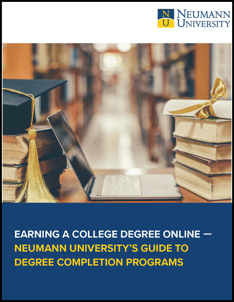
The importance of digital literacy in education today cannot be overstated. As hybrid and online classrooms become more prevalent, it’s essential for educators to leverage new technology and model digital literacy for their students.
Pursuing an online Master of Science in Education (MSEd) allows educators to develop and hone these skills while benefiting from a flexible curriculum and real-time application in their own classrooms. Whether you’re looking to design curriculum, create culturally responsive classrooms, or grow as a leader, an online MSEd offers a future-focused approach to accelerate your professional growth.
What is an MSEd Degree?
A Master of Science in Education (MSEd) is a graduate degree designed to help you enhance your teaching effectiveness, leadership abilities, and impact on student learning by honing your skills in data analysis, cultural responsiveness, curriculum development, and more. In short, an MSEd program has a technical focus on the art of teaching.
What’s more, an MSEd can open the door to career advancement. For instance, teachers with an Instructional I certification need 24 post-baccalaureate credits to qualify for their Instructional II certification, which can be earned through an MSEd program. In turn, accumulating graduate credits can unlock job opportunities with higher salaries. In addition to traditional teaching positions, you’ll have the experience to secure fulfilling roles, such as Instructional Coach, Academic Advisor, and Special Education Director, to name a few.
Why an Online Master’s in Education?
If you’re wondering whether an online MS in education is right for you, here are some key benefits to consider:
Flexibility and Immediate Application to Your Classroom
Whether you’re currently teaching or managing other commitments, an online MSEd offers the flexibility to learn on your schedule—without sacrificing academic rigor. With no geographic limitations, you can complete your coursework from anywhere, whether that’s your favorite coffee shop or the comfort of your own home.
Plus, you can immediately apply what you learn to your own classroom. From leveraging student performance data to tailoring instruction for diverse learners, you’ll gain actionable strategies for enhancing engagement and student achievement in real time.
Instant Educational Career Advancement
Earning an online MSEd sets you up for immediate career growth, whether you aspire to take on leadership roles, specialize in a STEM subject area, or spearhead innovation in education. Additionally, you’ll be able to virtually connect with other educators to learn about the latest industry trends and collaborate on projects, helping you grow your professional network.
As a result, you’ll be exposed to diverse educational systems and methodologies. Through studying case studies, analyzing best practices, and collaborating with peers across different school settings, you’ll develop a well-rounded approach to education that can be adapted for your own classroom or institution.
First-Hand Experience with Online Educational Tools
Technology has been undoubtedly reshaping education. As generative AI becomes more prevalent in the classroom due to its ability to create lesson plans, analyze data, and personalize learning, educators need professional development to help them navigate this rapidly evolving landscape.
In fact, according to HMH’s 2024 Educator Confidence Report, 53% of educators who don’t use AI are concerned about how to implement it safely and ethically. An online master’s program in education offers a flexible, future-focused solution for teachers who want to learn how to leverage new educational tools responsibly and stay ahead of the curve.
Developing Online Classroom Experience: Why Are Digital Literacy Skills Necessary In Education?
With the rise of online and hybrid learning models in K-12 and higher education, digital literacy is imperative for enhancing student engagement and learning outcomes. Digital literacy in education encompasses both technical skills to operate devices and cognitive skills to discern the credibility and accuracy of online information. While technology certainly streamlines several aspects of education, some common pitfalls include distraction and academic dishonesty. Therefore, educators play an important role in teaching and modeling digital responsibility for their students.
Online education master’s degree programs allow teachers to explore and gain proficiency in emerging digital tools and instructional technologies, such as learning management systems, research databases, collaborative software programs, presentation platforms, video editing tools, AI, and more. Teachers can also learn how to integrate assistive technology, such as text-to-speech tools, optical character recognition, and sound field systems, to make activities accessible for students with disabilities.
In addition, educators will learn how to strategically integrate these digital tools to provide students with engaging experiences that align with learning objectives and promote critical thinking.
Pursue Your Master’s Degree in Education Online at Neumann University
At Neumann University, we offer a variety of Master of Science in Education programs for you to choose from, depending on your professional goals. Whether you’re interested in online instruction, special education, instructional coaching, or principal certification, you’ll gain the skills needed to excel in your classroom or institution—in a flexible, 100% online setting.
On top of being able to learn from anywhere, our accelerated programs allow you to earn your degree in less than two years. In those 12-18 months, you’ll benefit from online peer collaboration and maximum one-on-one interaction with our expert faculty.
Have questions? We’d love to chat! Feel free to request more information about your program of interest. If you’re ready to take the next step in your teaching career, apply today!
 CHALLENGE
CHALLENGE











